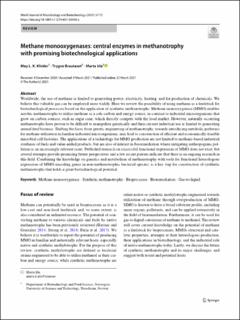| dc.contributor.author | Khider, May Laura Kilano | |
| dc.contributor.author | Brautaset, Trygve | |
| dc.contributor.author | Irla, Marta Katarzyna | |
| dc.date.accessioned | 2021-04-26T12:26:07Z | |
| dc.date.available | 2021-04-26T12:26:07Z | |
| dc.date.created | 2021-04-23T10:04:49Z | |
| dc.date.issued | 2021 | |
| dc.identifier.citation | World Journal of Microbiology & Biotechnology. 2021, 37 (72), . | en_US |
| dc.identifier.issn | 0959-3993 | |
| dc.identifier.uri | https://hdl.handle.net/11250/2739634 | |
| dc.description.abstract | Worldwide, the use of methane is limited to generating power, electricity, heating, and for production of chemicals. We believe this valuable gas can be employed more widely. Here we review the possibility of using methane as a feedstock for biotechnological processes based on the application of synthetic methanotrophs. Methane monooxygenase (MMO) enables aerobic methanotrophs to utilize methane as a sole carbon and energy source, in contrast to industrial microorganisms that grow on carbon sources, such as sugar cane, which directly compete with the food market. However, naturally occurring methanotrophs have proven to be difficult to manipulate genetically and their current industrial use is limited to generating animal feed biomass. Shifting the focus from genetic engineering of methanotrophs, towards introducing metabolic pathways for methane utilization in familiar industrial microorganisms, may lead to construction of efficient and economically feasible microbial cell factories. The applications of a technology for MMO production are not limited to methane-based industrial synthesis of fuels and value-added products, but are also of interest in bioremediation where mitigating anthropogenic pollution is an increasingly relevant issue. Published research on successful functional expression of MMO does not exist, but several attempts provide promising future perspectives and a few recent patents indicate that there is an ongoing research in this field. Combining the knowledge on genetics and metabolism of methanotrophy with tools for functional heterologous expression of MMO-encoding genes in non-methanotrophic bacterial species, is a key step for construction of synthetic methanotrophs that holds a great biotechnological potential. | en_US |
| dc.language.iso | eng | en_US |
| dc.publisher | Springer | en_US |
| dc.rights | Navngivelse 4.0 Internasjonal | * |
| dc.rights.uri | http://creativecommons.org/licenses/by/4.0/deed.no | * |
| dc.title | Methane monooxygenases: central enzymes in methanotrophy with promising biotechnological applications | en_US |
| dc.type | Peer reviewed | en_US |
| dc.type | Journal article | en_US |
| dc.description.version | publishedVersion | en_US |
| dc.source.pagenumber | 11 | en_US |
| dc.source.volume | 37 | en_US |
| dc.source.journal | World Journal of Microbiology & Biotechnology | en_US |
| dc.source.issue | 72 | en_US |
| dc.identifier.doi | 10.1007/s11274-021-03038-x | |
| dc.identifier.cristin | 1905968 | |
| cristin.ispublished | true | |
| cristin.fulltext | original | |
| cristin.qualitycode | 1 | |

